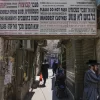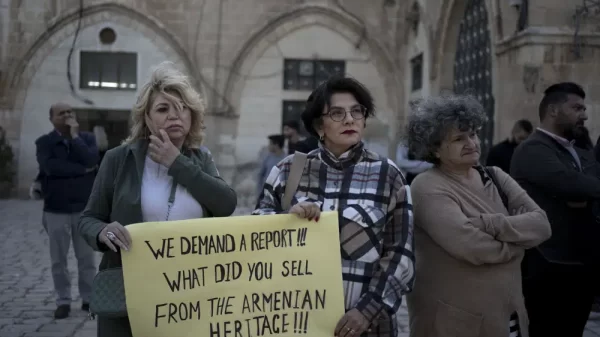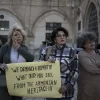Israeli couple Noemie Azerad, right, and her husband Simon David Benhamou grasp each others hands on the shoulders of skullcap-wearing groomsmen during their wedding party at a hotel in Dubai, United Arab Emirates, Thursday, Dec. 17, 2020. For the past month, Israelis long accustomed to traveling incognito, if at all, to Arab countries, have made themselves at home in the UAE’s commercial hub.(AP Photo/Kamran Jebreili)
DUBAI, United Arab Emirates (AP) — It was a scene that just a few months ago would have been unthinkable. As Emiratis in flowing white robes and headdresses looked on, the Israeli bride and groom were hoisted on the shoulders of skullcap-wearing groomsmen and carried toward the dance floor, where dozens joined the throng swaying and singing in Hebrew.
Noemie Azerad and Simon David Benhamou didn’t just throw a somewhat normal wedding bash in the middle of a pandemic that has shut down their country and ravaged the world. They were reveling in Dubai in the United Arab Emirates, which—like most of the Arab world—had been off-limits to Israeli passport holders for decades.
The pair was among tens of thousands of Israelis who had flocked to the UAE in December after the two countries normalized ties in a breakthrough U.S.-brokered deal.
Israel’s latest virus-induced lockdown, which began earlier this week, temporarily cooled the travel fever. But Israelis with dashed vacation plans, now stuck at home, hope that vaccination campaigns will help contain the outbreak and make Dubai trips possible again soon.
The lure of Dubai, the UAE’s skyscraper-studded commercial hub with sandy beaches and marbled malls, has already proven powerful. Scores of Israeli tourists, seeking revelry and relief from monthslong virus restrictions and undeterred by their government’s warnings about possible Iranian attacks in the region, have celebrated weddings, bar mitzvahs and the eight-day Jewish festival of Hanukkah with large gatherings banned back home.
“I expected to feel really uncomfortable here,” said 25-year-old Azerad, the Israeli bride, from the hotel ballroom, bathed in the glow of Dubai’s glittering skyline. But all of her preferred wedding destinations announced tough restrictions on gatherings to check the spread of the virus. Dubai caps parties at 200.
Unwilling to delay the wedding, the choice was obvious.
“I feel like it’s Tel Aviv,” Azerad said of Dubai. “I hear Hebrew everywhere.”
Her French father, Igal Azerad, said he always hides his skullcap in his pocket for fear of assault on the streets of Paris. But in Dubai the sight of his kippah prompts “Emiratis to come up and tell me ‘Shalom,’” he said.
The dizzying pace of normalization has stunned even the skeptics. Despite the countries’ long-secret ties, the UAE had considered Israel a political pariah over the decades-old Israeli-Palestinian conflict. The modest expat Jewish community in the federation of seven sheikhdoms kept a low profile and prayed in an unmarked villa.
Copyright 2020 Associated Press. All rights reserved.









































